-
REVIEW12-08-2023
Educational technologies for accident prevention due to falls in childhood: a scoping review
Revista Brasileira de Enfermagem. 2023;76:e20220807
Abstract
REVIEWEducational technologies for accident prevention due to falls in childhood: a scoping review
Revista Brasileira de Enfermagem. 2023;76:e20220807
DOI 10.1590/0034-7167-2022-0807
Views1See moreABSTRACT
Objectives:
to map evidence on educational technology use for accident prevention due to falls in childhood.
Methods:
a scoping review, carried out in October and November 2022, in the MEDLINE, Web of Science, BDENF and CINAHL databases and LILACS bibliographic index. There was no delimitation of language or time. Data were extracted and analyzed descriptively by two independent researchers. The research protocol was registered in the Open Science Framework.
Results:
twenty-six studies were selected. Booklets, pamphlets and leaflets were the most used technologies, presenting health services as the most frequent environment to develop research on fall prevention. The technologies developed were important outcomes: increased knowledge of children, family members, caregivers, health and education professionals.
Conclusions:
educational technology use makes it possible to increase knowledge, adopt safe practices and reduce falls.

-
ORIGINAL ARTICLE12-08-2023
Systematization of perioperative nursing care in robotic surgery: instrument validation
Revista Brasileira de Enfermagem. 2023;76:e20220666
Abstract
ORIGINAL ARTICLESystematization of perioperative nursing care in robotic surgery: instrument validation
Revista Brasileira de Enfermagem. 2023;76:e20220666
DOI 10.1590/0034-7167-2022-0666
Views0ABSTRACT
Objective:
To develop and validate an instrument to assist in the systematization of perioperative nursing care in robotic surgery.
Methods:
Methodological study developed in four phases: content survey; textual elaboration; content validation by the group of expert judges and target audience; and elaboration of the electronic instrument layout.
Results:
Eleven expert judges and seven evaluators of the target audience participated. For validation, the Content Validity Index (CVI) was used with a 0.78 cutoff point. The instrument total CVI after evaluation was 0.90 by the expert judges and 0.88 by the target audience.
Conclusion:
The tool built was proved satisfactory for the systematization of perioperative nursing care. The instrument construction was based on the updated scientific literature and validated by the expert judges and target audience.
Keywords:Nursing CarePerioperative CarePerioperative NursingRobotic Surgical ProceduresValidation StudySee more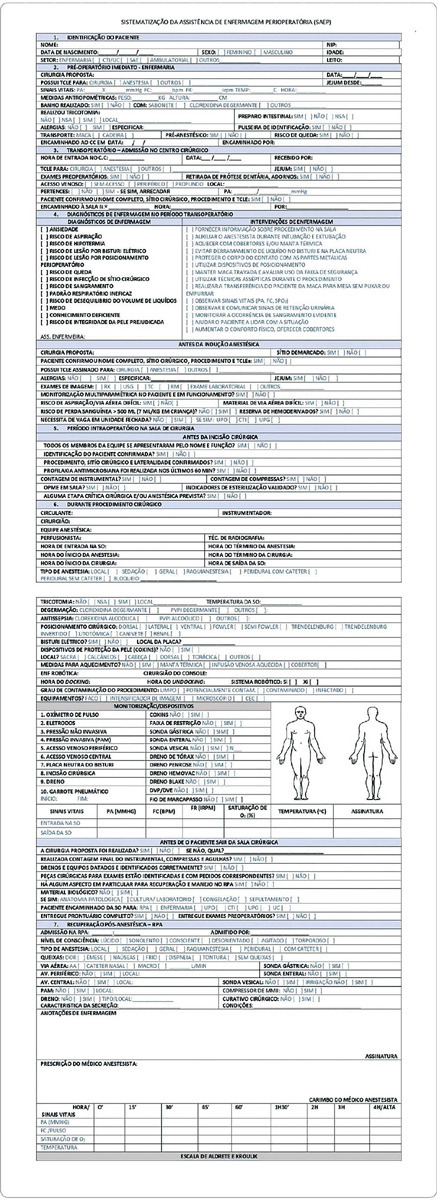
-
Influência da deambulação precoce combinada a terapia dhikr no peristaltismo intestinal de pacientes submetidos a colecistectomia aberta
Revista Brasileira de Enfermagem. 2023;76:e20220636
Abstract
Influência da deambulação precoce combinada a terapia dhikr no peristaltismo intestinal de pacientes submetidos a colecistectomia aberta
Revista Brasileira de Enfermagem. 2023;76:e20220636
DOI 10.1590/0034-7167-2022-0636
Views0RESUMEN
Objetivos:
analizar y determinar el efecto de una intervención que combinó la deambulación temprana y la terapia dhikr sobre la recuperación peristáltica intestinal de pacientes sometidos a colecistectomía abierta.
Métodos:
se utilizó un diseño preexperimental con un grupo pretest y postest. Las muestras incluyeron 15 pacientes sometidos a colecistectomía abierta y seleccionados mediante muestreo intencional. Los datos se recopilaron por medio de fichas de observación del instrumento y se analizaron mediante la prueba de Wilcoxon. La deambulación temprana utilizó el procedimiento operativo estándar en el hospital y la terapia dhikr se realizó durante 10 a 15 minutos, dos horas después de la operación.
Resultados:
la deambulación temprana asociada con la terapia dhikr afectó la recuperación peristáltica intestinal de los pacientes que se sometieron a colecistectomía abierta con anestesia general (Z =-3,442; p=0,001).
Conclusiones:
la combinación de la deambulación temprana con la terapia dhikr puede recomendarse como una intervención para mejorar el movimiento peristáltico intestinal de los pacientes después de una colecistectomía abierta con anestesia general.
Keywords:Anestesia GeralColecistectomiaDeambulação PrecoceEnfermagem PerioperatóriaTerapias ComplementaresSee more -
ORIGINAL ARTICLE12-08-2023
Early ambulation and dhikr complementary therapies effect on intestinal peristaltic in post-open cholecystectomy patients
Revista Brasileira de Enfermagem. 2023;76:e20220636
Abstract
ORIGINAL ARTICLEEarly ambulation and dhikr complementary therapies effect on intestinal peristaltic in post-open cholecystectomy patients
Revista Brasileira de Enfermagem. 2023;76:e20220636
DOI 10.1590/0034-7167-2022-0636
Views0ABSTRACT
Objectives:
to analyze and determine the effect of a combination intervention of early ambulation and dhikr therapy on intestinal peristaltic recovery in post-open cholecystectomy patients.
Methods:
a pre-experimental design with one group pre and post-test design was used. The samples were 15 post-open cholecystectomy patients which were selected using the purposive sampling technique. The data were collected using the instrument observation sheet and analyzed using the Wilcoxon test. Early ambulation used standard operational procedure in the hospital and dhikr therapy was carried out at 2 hours post-operation for 10-15 minutes.
Results:
there was an effect of early ambulation and dhikr therapy on intestinal peristaltic recovery in post-open cholecystectomy patients with general anesthesia (Z=-3.442; p=0.001).
Conclusions:
a combination of early ambulation and dhikr therapy can be recommended as interventions to improve intestinal peristaltic in a post-open cholecystectomy patient with general anesthesia.
Keywords:Anesthesia, GeneralCholecystectomyComplementary TherapiesEarly AmbulationPerioperative NursingSee more -
ORIGINAL ARTICLE12-08-2023
Workshop on pediatric trauma care: low-cost simulation
Revista Brasileira de Enfermagem. 2023;76:e20210485
Abstract
ORIGINAL ARTICLEWorkshop on pediatric trauma care: low-cost simulation
Revista Brasileira de Enfermagem. 2023;76:e20210485
DOI 10.1590/0034-7167-2021-0485
Views0See moreABSTRACT
Objective:
to assess nursing students’ and nurses’ knowledge, satisfaction and self-confidence after a theoretical workshop on emergency care for traumatized children and clinical simulation.
Methods:
a quasi-experimental study, carried out with nursing students and nurses residing at a public university in southern Brazil. A workshop on pediatric trauma care was created and a mannequin was created for simulations. A knowledge pre-test and post-test and the Student Satisfaction and Self-Confidence in Learning instrument were applied to measure satisfaction and self-confidence in learning. For analysis, descriptive statistics and the Wilcoxon test were used to compare means before and after intervention.
Results:
the difference between misses and hits was statistically significant (p<0.005), demonstrating an increase in participants’ knowledge after the workshop. Satisfaction and self-confidence were demonstrated in the instrument’s high scores.
Conclusions:
the effectiveness of the workshop in teaching-learning emergency care for pediatric trauma was demonstrated.
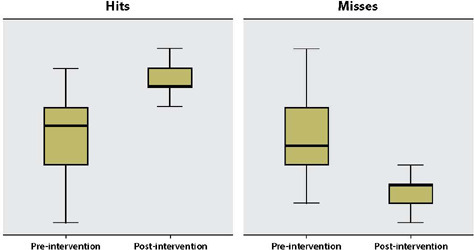
-
ORIGINAL ARTICLE12-08-2023
Validation of telesimulation in the care of late preterm newborns with hypoglycemia for nursing students
Revista Brasileira de Enfermagem. 2023;76:20220438
Abstract
ORIGINAL ARTICLEValidation of telesimulation in the care of late preterm newborns with hypoglycemia for nursing students
Revista Brasileira de Enfermagem. 2023;76:20220438
DOI 10.1590/0034-7167-2022-0438
Views0See moreABSTRACT
Objective:
To develop and validate a telesimulation scenario for nursing students in the care of late preterm infants with hypoglycemia.
Methods:
A methodological study conducted between August 2021 and May 2022 in a virtual environment involved constructing and validating the scenario with 10 experts, and testing it with 10 students. The content validity index assessed validity, with a threshold of 80% or higher, and suggestions were analyzed using semantic approximation.
Results:
Validation confirmed the appropriateness of all 14 scenario items, with an overall index of 97.8% and clarity and relevance indices of 98.5%. During testing, the overall index was 99.7%, with the “resources” item receiving the lowest score. Adjustments were made to objectives, technical terms, resources, and target audience based on feedback.
Conclusion:
Telesimulation is a widely accepted educational technology for training nursing students, with potential to enhance teaching quality and neonatal care.
-
ORIGINAL ARTICLE12-08-2023
Knowledge and practices about health among Quilombola men: contributions to health care
Revista Brasileira de Enfermagem. 2023;76:e20230138
Abstract
ORIGINAL ARTICLEKnowledge and practices about health among Quilombola men: contributions to health care
Revista Brasileira de Enfermagem. 2023;76:e20230138
DOI 10.1590/0034-7167-2023-0138
Views1ABSTRACT
Objective:
to analyze health knowledge and practices among Quilombola men.
Methods:
a qualitative, descriptive study, carried out with 40 men from two Quilombola communities in Santa Izabel do Pará, state of Pará, Brazil. Individual interviews were carried out using a semi-structured script. Text corpus was subjected to analysis with Interface de R pour les Analyses Multidimensionnelles de Textes et de Questionnaires 0.6, alpha 3, through Descending Hierarchical Classification.
Results:
among participants, eight (20.00%) were aged 55 to 59 years. 382 text segments were identified, with 299 (78.27%) being used, generating five lexical classes, which made up two subcorpora. The classes were organized into four thematic axes, covering knowledge about health and practices to prevent and solve health problems.
Final considerations:
men highlighted popular/traditional wisdom permeated by biomedical knowledge, translating their understanding of how to act to remain or become healthy.
Keywords:Health behaviorHealth of Ethnic MinoritiesMen’s HealthQuilombola CommunitiesVulnerable PopulationsSee more
-
ORIGINAL ARTICLE12-08-2023
Simulation-based training in Leprosy: development and validation of a scenario for community health workers
Revista Brasileira de Enfermagem. 2023;76:e20230114
Abstract
ORIGINAL ARTICLESimulation-based training in Leprosy: development and validation of a scenario for community health workers
Revista Brasileira de Enfermagem. 2023;76:e20230114
DOI 10.1590/0034-7167-2023-0114
Views0See moreABSTRACT
Objectives:
To build and validate a clinical simulation scenario designed to instruct community health workers (CHWs) in active leprosy case detection.
Methods:
Methodological study involving the development of a simulated clinical scenario and content validation by experts. The Content Validity Index (CVI) was used to determine the level of agreement among the judging commitee, and a descriptive analysis of their recommendations was performed.
Results:
A simulated scenario with a simulated participant was developed — a simulation characterized by low complexity, moderate physical/environmental fidelity, moderate to high psychological fidelity, and high conceptual fidelity, lasting 50 minutes and capable of training up to 10 CHWs simultaneously. The scenario was validated by 14 experts, with a CVI exceeding 80% for all components.
Conclusions:
The validated clinical simulation possesses attributes that make it highly reproducible in various national health contexts, thereby contributing to the global “Towards Zero Leprosy” strategy.
-
RESEARCH01-01-2017
Assessing the adequacy of workload measurement tools using a quality-based methodology
Revista Brasileira de Enfermagem. 2017;70(1):39-46
Abstract
RESEARCHAssessing the adequacy of workload measurement tools using a quality-based methodology
Revista Brasileira de Enfermagem. 2017;70(1):39-46
DOI 10.1590/0034-7167-2016-0246
Views0See moreABSTRACT
Objective:
determine which tool (NEMS and NAS) is most suitable for use in intensive care units using a quality-based methodology.
Method:
after identifying the opportunity for improvement “Inadequacy of the NEMS for determining nursing workload in the intensive care unit (ICU)”, we assessed the NEMS and the NAS, as a proposed improvement to the NEMS, using quality improvement cycles methodology based on the following criteria: measurement of daily nursing workload on a daily and shift basis; the tool encompasses all nursing activities undertaken in the ICU; and workload assessed per patient and unit.
Results:
there was no significant difference in level of compliance for the NEMS (67%). The comparison NEMS-NAS showed that there was a statistically significant improvement for all criteria except criterion 1. The NEMS only assesses criterion 1 (64.22%); while the NAS assessed all four criteria, obtaining a compliance rate of 64.74% for criteria 1, 2, and 4, and 100% for criterion 3.
Conclusion:
the NAS is more suitable for measuring nursing workload in UCIs.
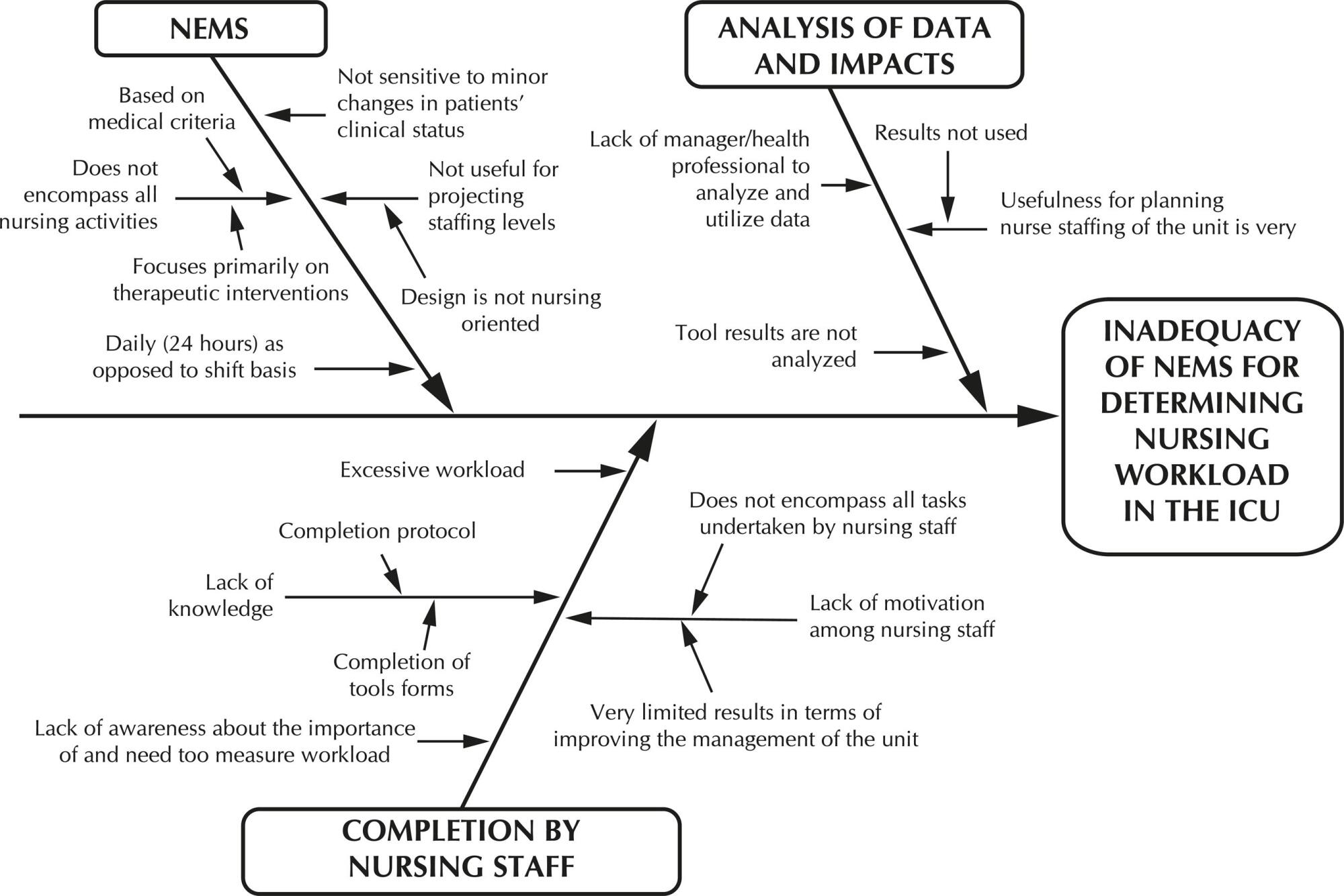
-
Educational nursing intervention to reduce the hyperphosphatemia in patients on hemodialysis
Revista Brasileira de Enfermagem. 2017;70(1):31-38
Abstract
Educational nursing intervention to reduce the hyperphosphatemia in patients on hemodialysis
Revista Brasileira de Enfermagem. 2017;70(1):31-38
DOI 10.1590/0034-7167-2016-0015
Views0See moreABSTRACT
Objective:
to evaluate the effectiveness of an educational nursing intervention to reduce hyperphosphataemia in chronic renal patients on hemodialysis.
Method:
quasi-experimental study with 63 hyperphosphatemic patients on hemodialysis. The intervention consisted of developing and providing a printed and illustrated manual to patients containing information on disease control. The participant was asked to complete a daily checklist with the aim to reinforce aspects provided in the manual. Laboratory tests and itching intensity were analyzed at the beginning of the study, and at 30 and 60 days after the educational intervention.
Results:
the mean age of participants was 58±13.1 years, with a treatment time of 51.1±44.7 months. A reduction in serum phosphorus values of 7.06 ± 1.43 to 5.80 ± 1.53 (p <0.001) and the intensity of itching after the intervention was observed.
Conclusion:
the educational nursing intervention was effective in reducing phosphate and decreasing itching in hyperphosphatemic patients.
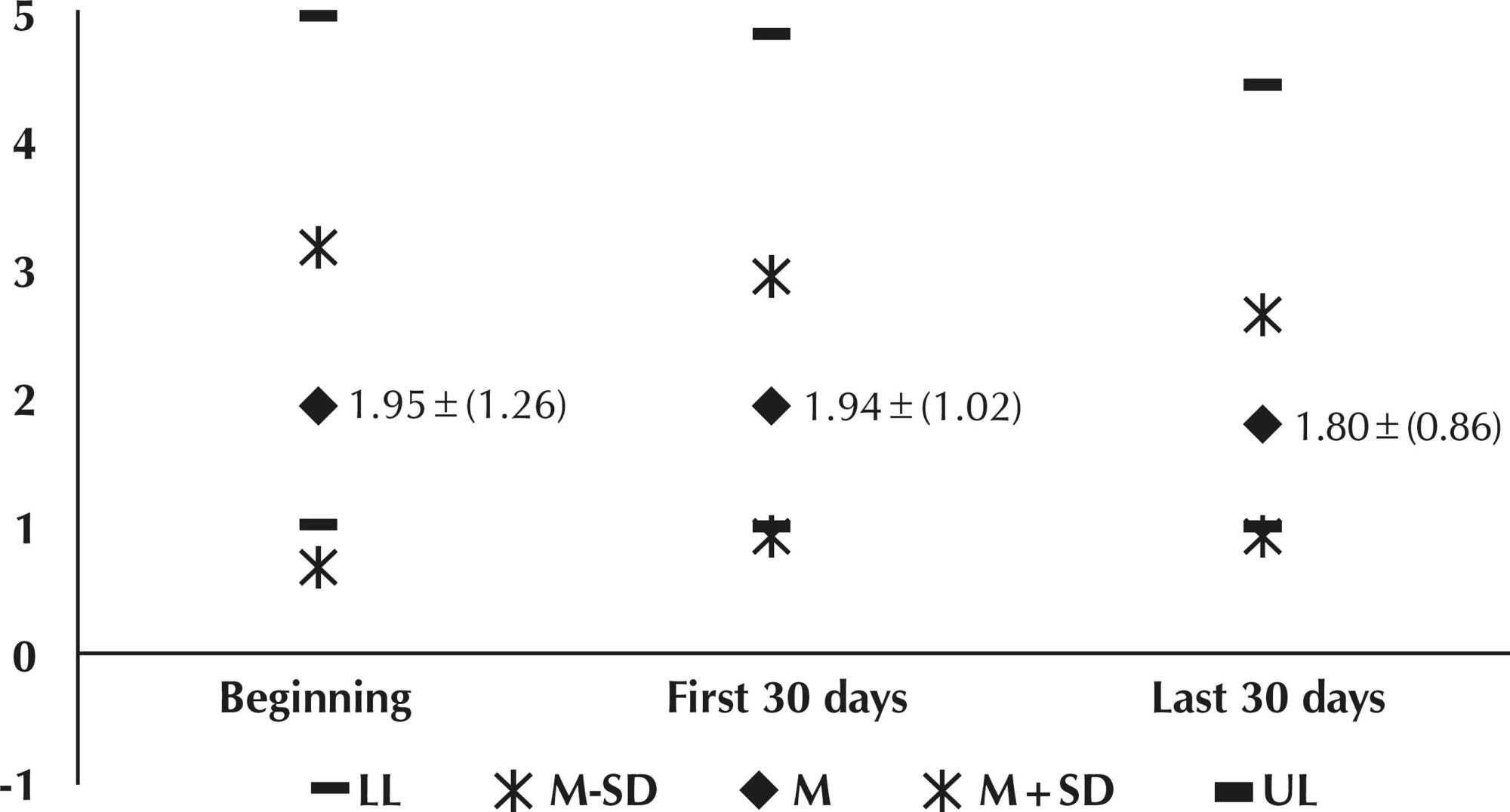
-
Filial care and the relationship with the elderly in families of different nationalities
Revista Brasileira de Enfermagem. 2017;70(1):22-30
Abstract
Filial care and the relationship with the elderly in families of different nationalities
Revista Brasileira de Enfermagem. 2017;70(1):22-30
DOI 10.1590/0034-7167-2015-0050
Views0See moreABSTRACT
Objective:
identify how filial care and the relationship with the elderly occur in families of different nationalities.
Method:
qualitative study carried out in a town on the triple frontier of Paraná, comprising 33 elderly people of five different nationalities, adopting the Symbolic Interactionism and the Grounded Theory as theoretical-methodological strategy.
Results:
among Lebanese people, the Muslim religion teaches children to obey and respect parents; among French, distant family relationships and institutions for the elderly stand out. Paraguayans hold close family relationships; Chinese people consider filial care as a tacit obligation; Brazilians, in turn, tend to embrace and take care of their parents in old age.
Conclusion:
family care prevailed, but the traditions of each society lead the actions of that care, demanding health professionals’ capacity of recognizing in which context the elderly is inserted.
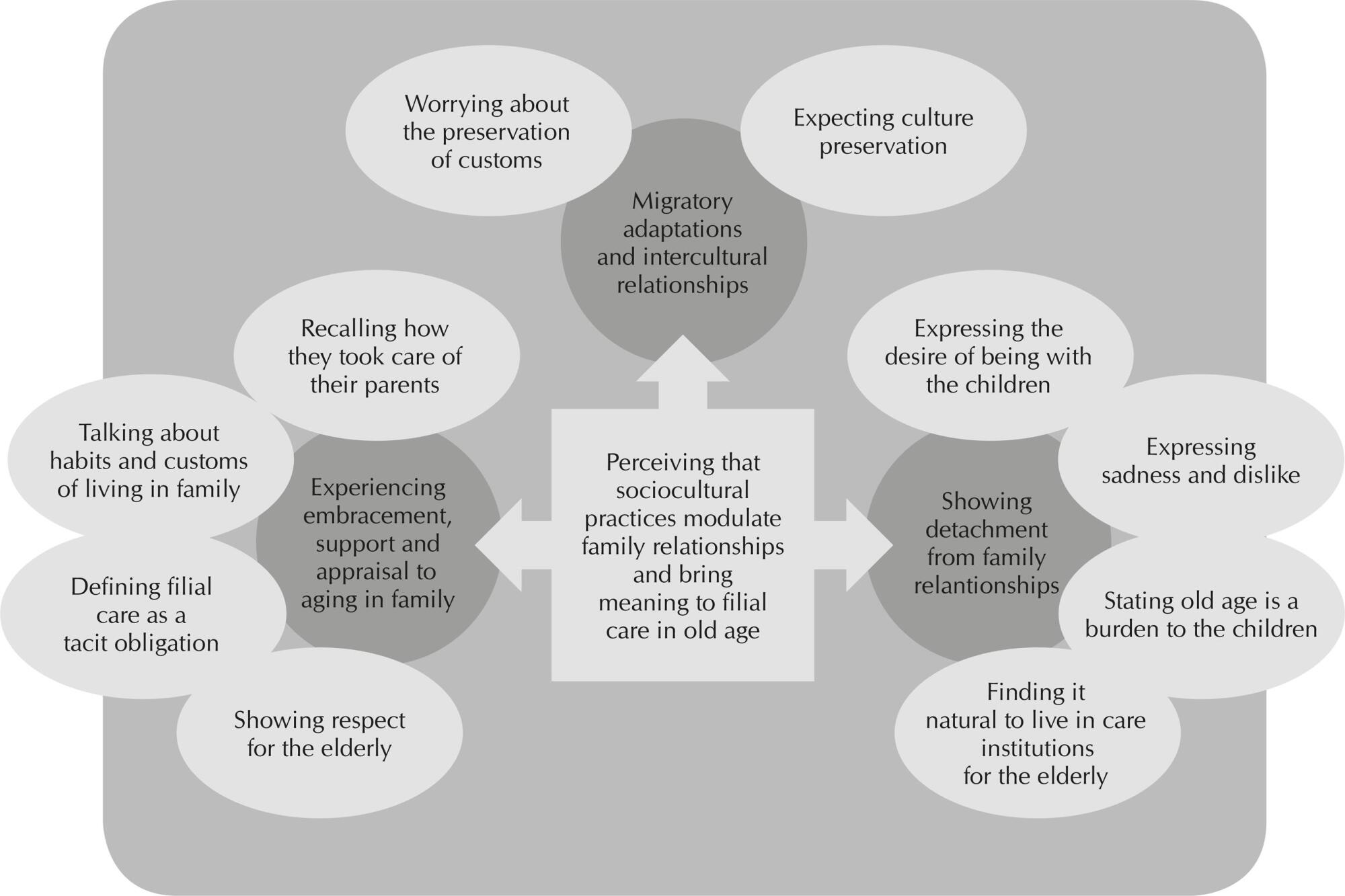
-
RESEARCH01-01-2017
Excesso de volume de líquidos: análise clínica e sociodemográfica em pacientes de hemodiálise
Revista Brasileira de Enfermagem. 2017;70(1):15-21
Abstract
RESEARCHExcesso de volume de líquidos: análise clínica e sociodemográfica em pacientes de hemodiálise
Revista Brasileira de Enfermagem. 2017;70(1):15-21
DOI 10.1590/0034-7167-2015-0138
Views0See moreRESUMEN
Objetivo:
analizar las características definitorias y los factores relacionados con el diagnóstico enfermero de exceso de volumen líquido y su relación con variables sociodemográficas y clínicas en pacientes de hemodiálisis.
Método:
estudio transversal, realizado mediante un formulario y examen físico, con una muestra de 100 pacientes, entre diciembre de 2012 y abril de 2013 en un hospital universitario y una clínica de diálisis.
Resultados:
se encontraron 10 asociaciones estadísticamente significativas entre las características definitorias, factores relacionados de volumen de exceso de líquido y las variables sociodemográficas y clínicas.
Conclusión:
las características definitorias y los factores relacionados de exceso de volumen líquido podrían estar influenciados por variables sociodemográficas y clínicas en clientes de hemodiálisis.
-
Excess fluid volume: sociodemographic and clinical analysis in haemodialysis patients
Revista Brasileira de Enfermagem. 2017;70(1):15-21
Abstract
Excess fluid volume: sociodemographic and clinical analysis in haemodialysis patients
Revista Brasileira de Enfermagem. 2017;70(1):15-21
DOI 10.1590/0034-7167-2015-0138
Views0See moreABSTRACT
Objective:
To analyse the defining characteristics and related factors in the nursing diagnosis Excess fluid volume and its relationship to sociodemographic and clinical variables in haemodialysis patients.
Method:
Cross-sectional study, conducted using a form and physical examination, with a sample of 100 patients, between December 2012 and April 2013 at a university hospital and a dialysis clinic.
Results:
It was found 10 significant statistical associations between the defining characteristics/ related factors of Excess fluid volume and the sociodemographic and clinical variables.
Conclusion:
The defining characteristics and related factors of Excess fluid volume could be influenced by sociodemographic and clinical variables in haemodialysis clientele.
-
Facing challenges in times of adversity
Revista Brasileira de Enfermagem. 2017;70(1):1-2
Abstract
Facing challenges in times of adversity
Revista Brasileira de Enfermagem. 2017;70(1):1-2
DOI 10.1590/0034-7167.2017700101
Views0At the confluence of tradition, respect for history and a critical approach to the issues inherent to the development of the nursing profession, the Brazilian Nursing Association (ABEn) has been consolidating an exemplary trajectory in Brazilian society. Throughout its history, the reflections, discussions and decisions on pertinent and urgent subjects of the profession have made […]See more -
Enfrentando desafios em tempos de adversidades
Revista Brasileira de Enfermagem. 2017;70(1):1-2
Abstract
Enfrentando desafios em tempos de adversidades
Revista Brasileira de Enfermagem. 2017;70(1):1-2
DOI 10.1590/0034-7167.2017700101
Views0Na confluência da tradição, do respeito pela história e da abordagem crítica das questões inerentes ao desenvolvimento da profissão de enfermagem, a Associação Brasileira de Enfermagem (ABEn) vem consolidando uma trajetória exemplar na sociedade brasileira. Ao longo da sua história, as reflexões, discussões e decisões sobre assuntos pertinentes e prementes da profissão têm possibilitado intervenções […]See more -
Epistemology of nursing care: a reflection on its foundations
Revista Brasileira de Enfermagem. 2016;69(6):1240-1245
Abstract
Epistemology of nursing care: a reflection on its foundations
Revista Brasileira de Enfermagem. 2016;69(6):1240-1245
DOI 10.1590/0034-7167-2016-0331
Views0See moreABSTRACT
Objective:
to reflect on nursing care and its epistemology from its historical, theoretical, philosophical, spiritual dimensions and as a social practice.
Method:
discussions originated in the discipline “Epistemology of caring”, from the graduate nursing program of the School of Nursing, Federal University of Minas Gerais, and in critical analysis of nursing literature together with the professional practice of the authors.
Results:
we identified the necessity of developing a critical conscience on health care provision, research, and teaching, as well as on challenges in maintaining high standards of working interpersonal relationships, which has a profound impact on population health.
Conclusion:
we suggest the rescue of integrality, humanization, unity, and spirituality in researches and practices of individual, familiar, and community care, as an advance in incorporating epistemology of caring in nursing.
-
ORIGINAL ARTICLE12-13-2024
Nurses’ experience regarding patient safety in mobile pre-hospital care
Revista Brasileira de Enfermagem. 2024;77(5):e20230529
Abstract
ORIGINAL ARTICLENurses’ experience regarding patient safety in mobile pre-hospital care
Revista Brasileira de Enfermagem. 2024;77(5):e20230529
DOI 10.1590/0034-7167-2023-0529
Views0See moreABSTRACT
Objectives:
to understand nurses’ experience regarding patient safety in mobile pre-hospital care.
Method:
a qualitative, exploratory and descriptive study, conducted with nurses active in mobile pre-hospital care services. Semi-structured interviews were conducted, audio-graved and submitted to Bardin’s content analysis.
Results:
from four thematic categories established, nurses reported the care and management skills necessary to work in this service. They demonstrated a commitment to ensuring safe care for patients, staff and spectators. They highlighted the actions taken to prevent and mitigate incidents. However, they based their experiences on practice protocols and individual actions, expressing the need to improve knowledge about patient safety.
Final Considerations:
mobile pre-hospital care nurses’ experience in relation to patient safety was limited, suggesting the need for training on the subject, alignment of work processes and implementation of strategies, aiming to guarantee safe care.
-
ORIGINAL ARTICLE12-13-2024
Repercussions of the pandemic on tuberculosis control actions from the perspective of health professionals
Revista Brasileira de Enfermagem. 2024;77(5):e20230477
Abstract
ORIGINAL ARTICLERepercussions of the pandemic on tuberculosis control actions from the perspective of health professionals
Revista Brasileira de Enfermagem. 2024;77(5):e20230477
DOI 10.1590/0034-7167-2023-0477
Views0See moreABSTRACT
Objectives:
to analyze the repercussions of the COVID-19 pandemic on tuberculosis control actions from the perspective of primary health care professionals.
Methods:
this descriptive study with a qualitative approach was conducted from November 2022 to April 2023, using semi-structured interviews with 11 key informant professionals from primary health care units in a Brazilian capital. Data were organized using Atlas.ti 22.0 software and subjected to thematic-categorical content analysis.
Results:
the pandemic scenario caused alterations in the work process, necessitating abrupt adaptations, and led to detrimental impacts on the health of professionals and tuberculosis control actions, which were reduced or discontinued.
Final Considerations:
there was evident unpreparedness and a lack of resources from various governmental levels and health services to handle the public health emergency situation without severe harm to the provision of essential services.
-
Training of Brazilian indigenous nurses: between human rights, valuing diversity and inclusion
Revista Brasileira de Enfermagem. 2024;77(5):e20230430
Abstract
Training of Brazilian indigenous nurses: between human rights, valuing diversity and inclusion
Revista Brasileira de Enfermagem. 2024;77(5):e20230430
DOI 10.1590/0034-7167-2023-0430
Views0See moreABSTRACT
Objectives:
to analyze the possibilities and potential of training indigenous nurses, given the Brazilian Health System (SUS), understanding the relationships between education and health.
Methods:
theoretical-reflective study, based on scientific literature, aligned with the experience, critical thinking of its authors and the Sustainable Development Goals in Brazil.
Results:
this text articulates three axes: Potential for including indigenous students in nursing training; Paths to achieving equity through inclusion and retention policies for indigenous students at different levels; and Implications of this for the SUS and global health.
Final Considerations:
indigenous students, beneficiaries of affirmative actions, face challenges of inclusion and retention in public universities that directly impact their academic training. Added to this are the difficulties identified in basic education, professor training and implementation of permanence policies, with consequences for services and training at other levels.
-
ORIGINAL ARTICLE12-13-2024
Interobserver agreement in Reception and Risk Stratification in Obstetrics implementation
Revista Brasileira de Enfermagem. 2024;77(5):e20230361
Abstract
ORIGINAL ARTICLEInterobserver agreement in Reception and Risk Stratification in Obstetrics implementation
Revista Brasileira de Enfermagem. 2024;77(5):e20230361
DOI 10.1590/0034-7167-2023-0361
Views0See moreABSTRACT
Objectives:
to analyze interobserver agreement in the Reception and Risk Stratification in Obstetrics protocol implementation.
Methods:
a cross-sectional study carried out during Reception and Risk Stratification in Obstetrics implementation, conducted in a tertiary hospital in southern Brazil with 891 participants in January 2020. Descriptive and interobserver agreement analysis was carried out using the Kappa coefficient in the risk stratification assigned by the triage nurse and reviewed by the researcher.
Results:
around half of the calls (55.6%) were stratified as not very urgent (green), followed by urgent (yellow) (31.8%), very urgent (orange) (9.3%), not urgent (blue) (3.4%) and no emerging stratification (red). Agreement analysis of revised stratification found Kappa values of 0.20 (blue), 0.54 (green), 0.77 (yellow) and 0.80 (orange).
Conclusions:
most appointments were non-urgent. The agreement analysis between the revised and assigned risk stratification revealed greater interobserver agreement as the priority level increased.
-
ORIGINAL ARTICLE12-13-2024
Adaptation and implementation of a Nursing care protocol for children in the Amazon Region
Revista Brasileira de Enfermagem. 2024;77(5):e20230245
Abstract
ORIGINAL ARTICLEAdaptation and implementation of a Nursing care protocol for children in the Amazon Region
Revista Brasileira de Enfermagem. 2024;77(5):e20230245
DOI 10.1590/0034-7167-2023-0245
Views0See moreABSTRACT
Objectives:
to describe the process of implementing an adapted protocol for pediatric nursing care in a health unit located in a municipality in the Amazon Region.
Methods:
methodological research conducted in a basic health unit with four family health teams in the state of Rondônia, involving seven nursing professionals. Data collection occurred between October 2020 and April 2022, following the research phases: situational diagnosis, exploratory phase, protocol definition, implementation, and evaluation.
Results:
the outcome was the adaptation and implementation of a nursing care protocol for children.
Final Considerations:
the adaptation and implementation process can be an effective approach to improving care, strengthening nursing as a profession with a solid foundation in scientific and clinical evidence. This facilitates early problem identification and appropriate guidance, leading to better health outcomes for children.
-
ORIGINAL ARTICLE12-13-2024
Nurses’ experiences in caring for people with mental health problems hospitalized due to clinical comorbidities
Revista Brasileira de Enfermagem. 2024;77(5):e20230136
Abstract
ORIGINAL ARTICLENurses’ experiences in caring for people with mental health problems hospitalized due to clinical comorbidities
Revista Brasileira de Enfermagem. 2024;77(5):e20230136
DOI 10.1590/0034-7167-2023-0136
Views0See moreABSTRACT
Objectives:
to understand nurses’ experiences in caring for people with mental health problems hospitalized due to clinical comorbidities in non-psychiatric Inpatient Units.
Methods:
qualitative study, guided by Alfred Schutz’s social phenomenology. Sixteen phenomenological interviews were conducted. The content was analyzed and discussed based on the literature, through the composition of three categories of analysis.
Results:
three categories emerged in the study: Challenges in care faced by nurses; Fragmented care action; and Ideal care. The disarticulation of the clinic was revealed, as described by nurses, showing care as an action far removed from the comprehensiveness of a person. Nurses’ performance is guided predominantly by biomedical reference, disregarding appreciation of subjectivity.
Final Considerations:
it was observed that nurses attribute the responsibility for patient care to factors external to their life-world, when, in fact, these aspects should be components that help them in comprehensive care construction.
-
REVIEW11-29-2024
Assessment of knowledge in oncology about care for transgender people: a scoping review
Revista Brasileira de Enfermagem. 2024;77:e20230532
Abstract
REVIEWAssessment of knowledge in oncology about care for transgender people: a scoping review
Revista Brasileira de Enfermagem. 2024;77:e20230532
DOI 10.1590/0034-7167-2023-0532
Views0ABSTRACT
Objective:
to identify evidence available in the literature on instruments and methodologies used to assess healthcare professionals’ knowledge about cancer care for the transgender population.
Methods:
a scoping review was conducted in seven databases, including studies that answered the question: what is the healthcare professionals’ level of knowledge about cancer care for the transgender population?
Results:
forty-one articles were selected that dealt specifically with healthcare professionals’knowledge in relation to care for the LGBTQIAPN+ population, especially the transgender population. Eighteen studies assessed patients’ perceptions of professionals’knowledge, whereas other studies used their own assessment tools, considering the global context of LGBTQIAPN+ health.
Conclusions:
there is no tested and validated instrument that assesses the knowledge about the transgender population’s oncological health, highlighting the need to construct and validate an instrument focused on this population’s needs.
Keywords:Health Services for Transgender PeopleNeoplasmsOncologyProfessional TrainingTransgender PeopleSee more
Search
Search in:
Nuvem de Tags
Aged (144) Atenção Primária à Saúde (239) COVID-19 (104) Cuidados de Enfermagem (269) Educação em Enfermagem (151) Educação em Saúde (139) Enfermagem (930) Estudos de Validação (131) Health Education (144) Idoso (208) Mental Health (149) Nursing (987) Nursing Care (306) Patient Safety (151) Primary Health Care (284) Qualidade de Vida (104) Quality of Life (106) Saúde Mental (145) Segurança do Paciente (150) Validation Studies (108)



